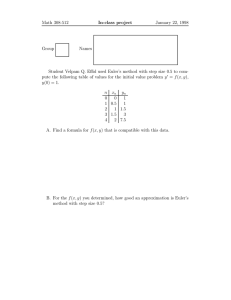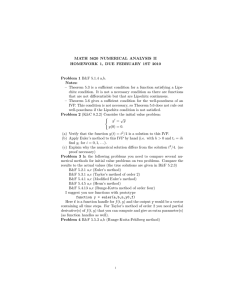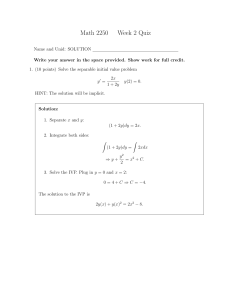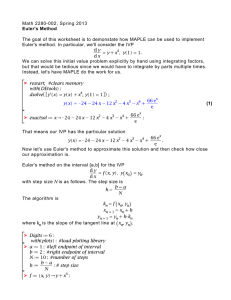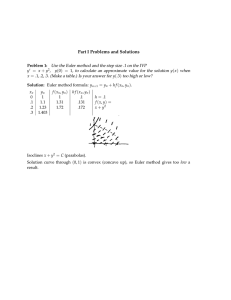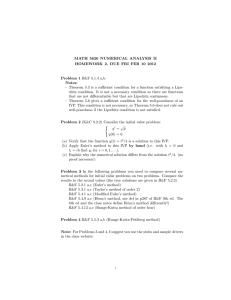Solutions (pdf file) - UC Davis Mathematics
advertisement
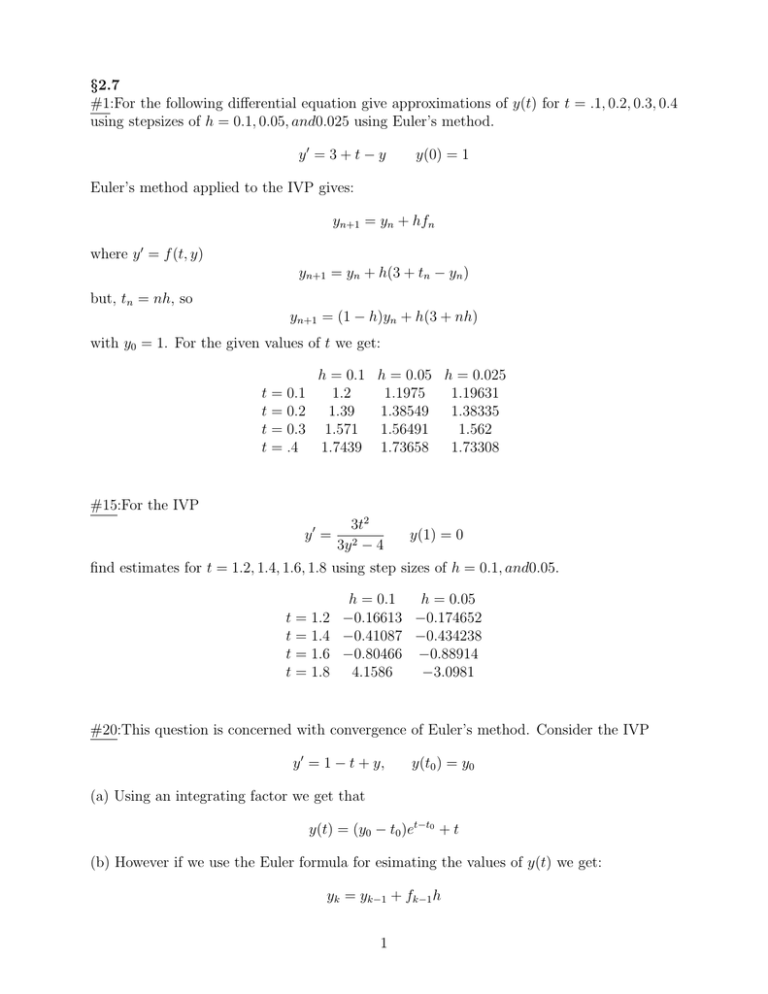
§2.7 #1:For the following differential equation give approximations of y(t) for t = .1, 0.2, 0.3, 0.4 using stepsizes of h = 0.1, 0.05, and0.025 using Euler’s method. y0 = 3 + t − y y(0) = 1 Euler’s method applied to the IVP gives: yn+1 = yn + hfn where y 0 = f (t, y) yn+1 = yn + h(3 + tn − yn ) but, tn = nh, so yn+1 = (1 − h)yn + h(3 + nh) with y0 = 1. For the given values of t we get: h = 0.1 h = 0.05 h = 0.025 t = 0.1 1.2 1.1975 1.19631 t = 0.2 1.39 1.38549 1.38335 t = 0.3 1.571 1.56491 1.562 t = .4 1.7439 1.73658 1.73308 #15:For the IVP y0 = 3t2 3y 2 − 4 y(1) = 0 find estimates for t = 1.2, 1.4, 1.6, 1.8 using step sizes of h = 0.1, and0.05. h = 0.1 h = 0.05 t = 1.2 −0.16613 −0.174652 t = 1.4 −0.41087 −0.434238 t = 1.6 −0.80466 −0.88914 t = 1.8 4.1586 −3.0981 #20:This question is concerned with convergence of Euler’s method. Consider the IVP y 0 = 1 − t + y, y(t0 ) = y0 (a) Using an integrating factor we get that y(t) = (y0 − t0 )et−t0 + t (b) However if we use the Euler formula for esimating the values of y(t) we get: yk = yk−1 + fk−1 h 1 = yk−1 + (1 − tk−1 + yk−1 )h = (1 + h)yk−1 + h − htk−1 (c) To show that yn = (1 + h)n (y0 − t0 ) + tn ∀n we use induction. for n = 1 we have y1 = (1 + h)y0 + h − ht0 by the Euler formula. Now we add an subtract t0 to get y1 = (1 + h)y0 + h − ht0 = (1 + h)y0 − t0 − ht0 + h + ht0 = (1 + h)y0 − (1 + h)t0 + (h + t0 ) = (1 + h)(y0 − t0 ) + t1 since tn = h + tn−1 . Now, assume that the formula holds for n = K. Consider when n = K + 1. By part (b) we have yK+1 = (1 + h)yk + h − htk Subtituting in for yK we get yK+1 = (1 + h) (1 + h)K (y0 − t0 ) + tK + h − htK Distributing terms leaves yK+1 = (1 + h)K+1 (y0 − t0 ) + tK + h + htK − htK which gives yK+1 = (1 + h)K+1 (y0 − t0 ) + tK+1 (d) Now if we set h = (t−t0 ) n then tn = t ∀n so we have: lim yn = lim (1 + h)n (y0 − t0 ) + tn n→∞ = lim n→∞ n→∞ (t − t0 ) 1+ n n (y0 − t0 ) + t = et−t0 (y0 − t0 ) + t which is the solution obtained using the integrating factor. §2.8 #1:Convert the IVP at the origin. dy dt = t2 + y 2 , y(1) = 2 to an equivalent one with the initial condition Solution: We make a change of variable have: Thus t −→ t0 t = 1 −→ t0 = 0 such that . So we y −→ y 0 y = 2 −→ y 0 = 0 t0 = t − 1 −→ dt0 = dt y 0 = y − 2 −→ dy 0 = dy dy dy 0 = 0 = (t0 + 1)2 + (y 0 + 2)2 dt dt 2 So the new IVP is: dy 0 = (t0 + 1)2 + (y 0 + 2)2 dt0 y(0) = 0 #4:Use Picard Iterates with φ0 = 0 to find approximate solutions for y 0 = −y − 1 y(0) = 0 Rt Solution Using the formula φn (t) = 0 φn−1 (s)ds we get: φ1 = −t, φ2 = 3 2 3 2 t4 − t6 + t2 − t, φ4 = 24 − t6 + t2 − t. So we see that φn (t) = n X k=1 (−1)k t2 2 − t, φ3 = tk k! If we solve the ODE using separation of variables we get y(t) = e−t + 1. So we see that the Picard Iterates generate the Taylor Series for y(t) which converges for all t. 3
